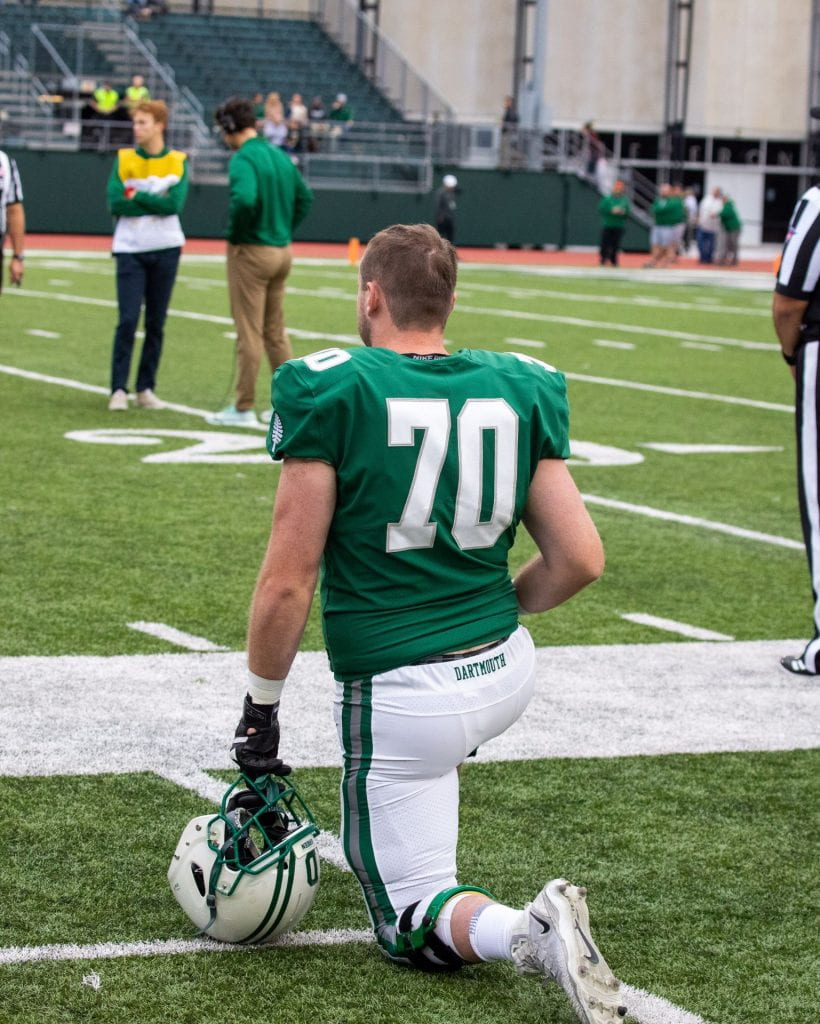Scan of Contract:
Scan of informants’ signatures:

Scan of Contract:
Scan of informants’ signatures:
Group 7 Folklore Collection Project
The goal of our project was to find any pre-competition superstitions and rituals that existed among the Men’s sports teams here at Dartmouth. We were open to both individual and team rituals, and then categorized them into their respective magical forms of superstitions.
While many of the found superstitions were seemingly individual, we found that their origins were from deeply prior to Dartmouth. None of the informants were aware of the origin of their superstitions, but they all noted that it was either something that they grew up with in their region or were introduced to at Dartmouth.
We conducted 35 total interviews and then graphed the results. At least one member from every Men’s Varsity sport was interviewed with the same five questions. We asked about superstitions on the individual and team level. The questions were as follows:

In the folklore we collected, we found that the overwhelming majority of superstitions were classified as magical. Only one was sign and zero were conversion superstitions. We felt this was because many athletes feel like they create their own luck and success. Sign superstitions and conversion superstitions are based on outside influence. For example, a sign superstition is like if they see a black cat then they will not play well and a conversion superstition would be if they saw a black cat they would have to do ten pushups to have a good game later that day. Both of those types of superstitions involve the outside source of the cat that the athletes do not control. However, for magical superstitions, these are things that people can control for example, if an athlete eats well then they will play well. The athlete can choose to do something he knows will make him play better. So from this we concluded as we stated before, athletes believe more in creating their own luck and success rather than depending on an outside source to tell them how they will perform.

Breaking down the Magical superstitions by type, sympathetic was the biggest category, followed by homeopathic and then contagious. We think contagious was lowest because a majority of superstitions in this category include a severed body part or part of some magical item. Not many people carry around parts of magical items with them in modern times and most people do not carry around severed body parts to help them in sports. The contagious magic we did find involved someone changing their physical features like cutting their hair, not body parts. Finally we believe that sympathetic was the biggest category because sympathetic magic involves a connection between two things and the main goal in sports is to connect what is learned in practice to execution in a game. For example, if a player practices their rail shots then they will perform better in the squash match. The two are connected as the what the player does in practice should connect and happen in the game as well which is the basic principal of the cliche practice makes perfect. We think this sympathetic property in sports opens athletes up to having a larger number of sympathetic superstitions than magical superstitions of other types.
Title: One Strip Wonder
General Information about Item:
Informant Data:
Contextual Data:
Item:
Associated file (a video, audio, or image file):
Transcript:
Informant’s Comments:
Collector’s Comments:
Collector’s Name:
Jack Cameron
Dartmouth College
Russ013 21F
Prof. Apresyan and Prof. Gronas
Title: No Cuts Allowed!
General Information about Item:
Informant Data:
Contextual Data:
Item:

Associated file (a video, audio, or image file):
Transcript:
Informant’s Comments:
Collector’s Comments:
Collector’s Name:
Jack Cameron
Dartmouth College
Russ013 21F
Prof. Apresyan and Prof. Gronas
Title: Left First
General Information about Item:
Informant Data:
Contextual Data:
Item:
A stretching routine is very common. Often led by team leaders, seniors or captains, pre-game stretching routines take place in almost all sports across the world. Each stretching routine can be different depending on the sport, but this routine has the Offensive Linemen always stretch the left body part before their right.

Associated file (a video, audio, or image file):
Transcript:
“This is me stretching my left hip flexor. Our pregame stretching superstition always starts with the left side first. Left hamstring, then right hamstring. Left calf, then right calf, etc. I think it started almost 10 years ago because it’s luckier to stretch on the heart side first, that way if something gets banged up on the right side we can always say ‘it’s a long way from the heart’ and keep on moving forward.”
Informant’s Comments:
Found this to be interesting and now found that I do lots of things in my day left side first. Put on pants left leg before the right, socks and shoes left before right and such.
Collector’s Comments:
I found this pregame superstition to be quite interesting, especially since it has since carried over into his everyday life. I think that protecting the heart side is an interesting concept that I would highly consider incorporating into my own life for a feeling of safety.
Collector’s Name:
Jack Cameron
Dartmouth College
Russ013 21F
Prof. Apresyan and Prof. Gronas
Title: Setting Watches for Dartmouth
General Information about Item:
Informant Data:
Contextual Data:
Item:
Associated file (a video, audio, or image file):
Transcript:
Informant’s Comments:
Collector’s Comments:
Collector’s Name:
Jack Cameron
Dartmouth College
Russ013 21F
Prof. Apresyan and Prof. Gronas
Title: White Left Wrist
General Information about Item:
Informant Data:
Contextual Data:
Item:
Associated file (a video, audio, or image file):
Transcript:
Informant’s Comments:
Collector’s Comments:
Collector’s Name:
Jack Cameron
Dartmouth College
Russ013 21F
Prof. Apresyan and Prof. Gronas